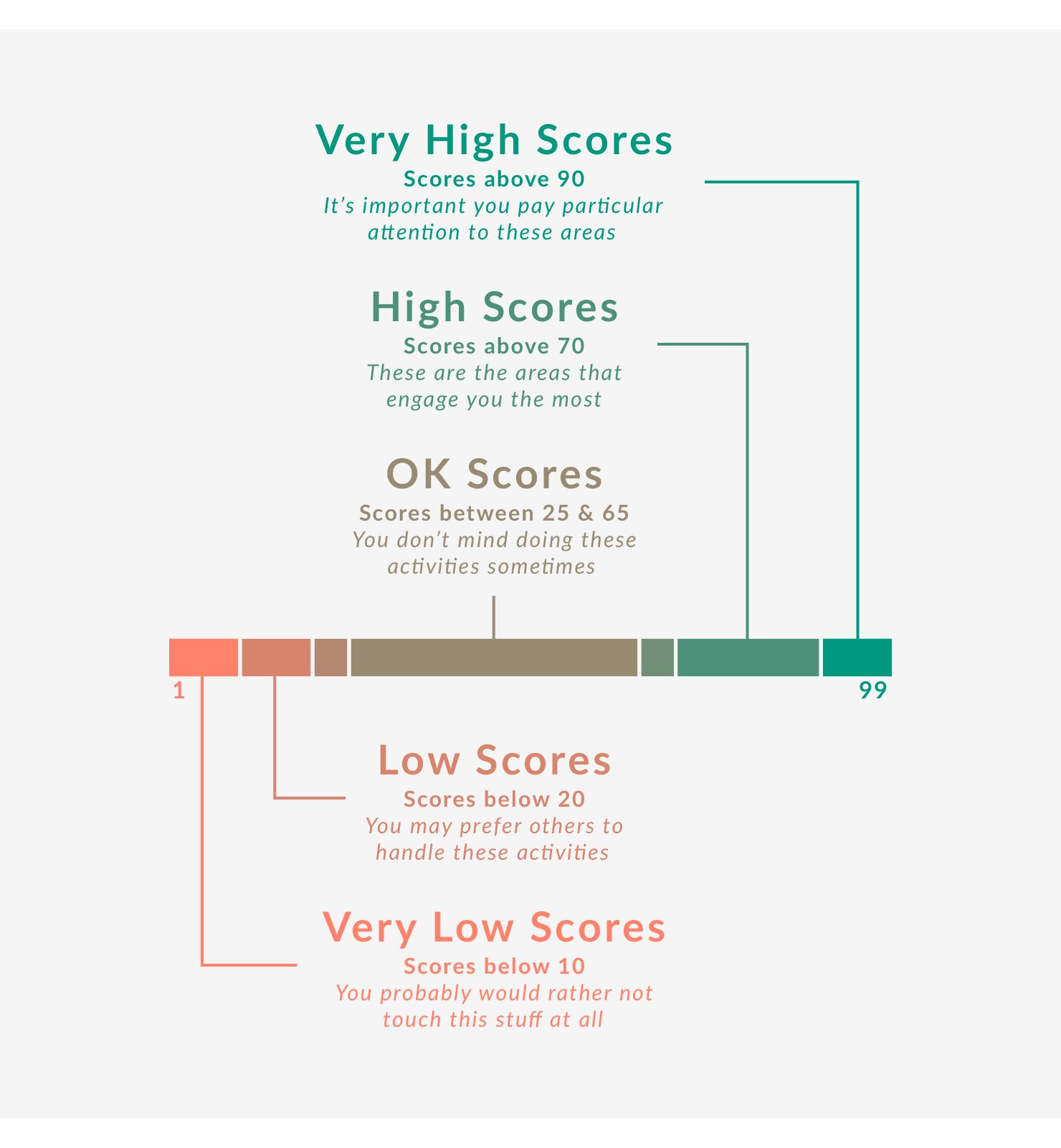
The Interests Scale
Let’s talk about Areas of Interest.
To see your own scores and read the explanations for each one, log into the platform, go to In-Depth Report, and click on Areas of Interest.
The first thing to note is that everyone gets the same 10 Interests - but the order and magnitude (see the numbers in brackets) of these scores is different for each individual.
(It technically is possible that you could meet someone with exactly the same scores as you, but the likelihood of that happening is exceptionally low..!)
The second thing to note is that these Interest scores are measuring Motivation. They do not represent skill.
What that means is that you could be getting straight A’s in Maths, and find it perfectly easy working with numbers, but - if it’s not what drives and motivates you - you might score only a 12 on Numerical.
Equally, a score of 98 on Artistic doesn’t necessarily mean you have any skills when it comes to drawing or painting or graphic design…
These scores tell us what interests and motivates you - but not what skills you possess, or where your talents necessarily lie.
A High Score does not equal skill and a Low Score does not equal no skill.
For each of the 10 Interests, you’ll see you have a score somewhere between 1 and 99.
If you picture a scale (or make use of the one below), anything at the far end of the scale near 1 represents a very low score, and anything that comes at the far end of the scale near 99 is a very high score.

Very low scores (between 1 and 10) are those Areas of Interest that don’t really interest you at all! These are the things you might find yourself trying to avoid, and wishing someone else would deal with… If you have to spend any prolonged period of time on these areas you are likely to feel drained, lacking energy, and uninspired as a result!
Low scores (between 10 and 20) are, similarly, areas that you probably have very little interest in. You won’t find them as draining as your very low scores (if you have any) but you’re unlikely to be seeking out these kinds of activities!
High scores are those of around 70 or higher. These are the things you’re likely to be drawn to - you may have hobbies that fit with these scores, or spend your free time seeking out opportunities to be involved with these areas - either way, doing this stuff is what helps you to feel happy and engaged. For you, time spent on these things is time well spent!
Very high scores (of 90 or higher) are even more important for you. If you have scores in this range, and aren’t engaging with those areas you are likely to suffer as a result. These are the things you need to be spending time on regularly, in order to feel like yourself!
Scores that fall in-between (particularly the 25-65 range) are what we call OK scores and that pretty much sums up how you are likely to feel about any Interests you have in this range. They are things you find OK and might quite enjoy doing, but which you may find draining in the long run if you aren’t getting enough breaks or chances to engage your high scores.
Another way of looking at it is that these OK scores can be things you like doing, but they aren’t what you live for - they’re not what gets you out of bed in the morning! (And the lower down the OK range they are, the less ‘OK’ you are likely to find them..!)
Have a look at your own data on the Areas of Interest page, and make sure you click through each of the 10 Interest icons to read the descriptions and explanation.
Where do your Interests fall? Do you have a lot of very high or very low scores? Or do most of the 10 fall somewhere in the OK range? What might this mean for you?
Make notes for yourself on what you learn, particularly any scores you think might be particularly significant. If you have very high scores, for instance, how can you make sure that you are engaging those interests each week to keep yourself feeling motivated and energised?
